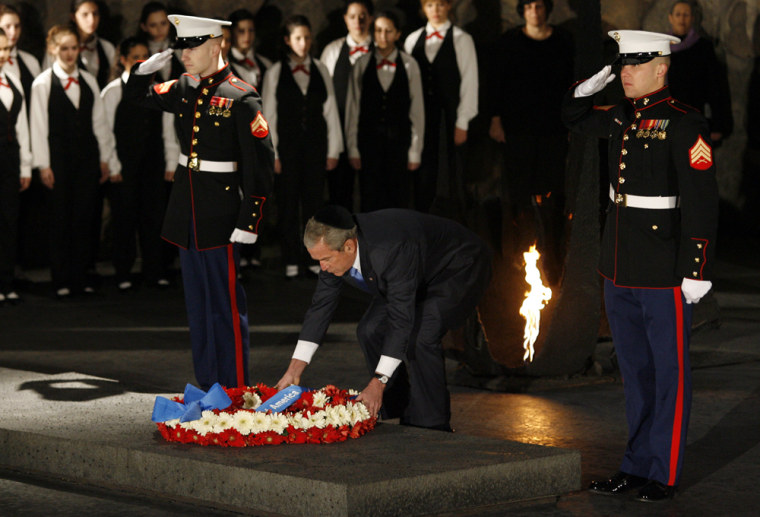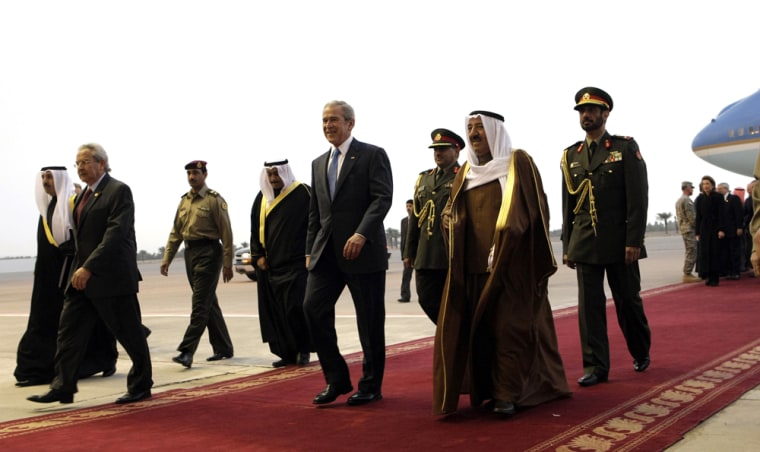The United States dampened hopes Friday for swift agreement on a Mideast peace deal, as Secretary of State Condoleezza Rice cautioned against expecting a "blinding flash" of Arab backing for cooperation with Israel, their historic enemy.
President Bush began the next chapter of his eight-day Mideast journey in Kuwait, the first of five Arab countries on an itinerary aimed at pressing them to support Palestinian leader Mahmoud Abbas in any deal he strikes with Israel.
Bush landed here after two days of talks in Israel and the Palestinian-governed West Bank. Traveling with the president, Rice said, "There will be a period of time, undoubtedly, in which the two sides continue to be very far apart."
But, she said, "There is reason to be hopeful that they can make a major move to end the conflict."
On Saturday, Bush will address U.S. forces at Camp Arifjan, the largest U.S. base in Kuwait and home to 9,000 American troops. He also will get a briefing on the war by Gen. David Petraeus, the top U.S. commander in Iraq, and Ambassador David Crocker, who is pressing Iraq's government to make progress on long-delayed political reconciliation.
The pair are due to give Congress an update on the war in March, one that will be closely watched for whether deeper cuts in the U.S. troop level in Iraq are possible.
Big arms deal for Saudi Arabia
Bush will notify Congress on Monday of his intent to sell $20 billion in weapons, including precision-guided bombs, to Saudi Arabia, moving up the announcement to coincide with the president's arrival in Riyadh, a senior official said in Washington. The official announcement will kick off a 30-day review period during which Congress could try to block the sale, which has raised concern among some lawmakers.
Arriving at the airport in Kuwait, the president got a ceremonial red-carpet welcome and was presented with a bouquet of flowers. But he saw nothing like the torrent of public adulation showered on his father in a visit 15 years ago.
The tiny, oil-rich nation at the top of the Persian Gulf was invaded by Iraq's Saddam Hussein and liberated by a U.S.-led war ordered by Bush's father in 1991. Now, Kuwait is a major hub for U.S. troops and equipment deployed to Iraq.
At a palace surrounded by palm trees, Bush met with the emir, Sheik Sabah Al Ahmed Al Sabah. He told Bush he was delighted to have him in Kuwait. "We are equally delighted to see you working on issues that are very important to all of us here," Sheik Sabah said. It was not clear what issues he meant.
Like other Gulf Arab nations, Kuwait is nervous about tensions between the United States and Iran, and uneasy with the rise of Tehran. Kuwaitis also fear sectarian violence in Iraq could spill over their border.
Kuwait skipped Anapolis peace talks
Kuwait was conspicuous by its absence from Annapolis, Md., last year where Bush held a high-profile meeting and coaxed Israelis and Palestinians to launch their first peace talks in seven years. "They had their own reasons," Rice said of Kuwait without elaboration. Iraq was the only other invited guest to skip Annapolis.

Close Arab allies, including Egypt and Saudi Arabia, have urged Bush to get more directly involved in Mideast peacemaking, saying the Palestinian plight spawns other conflicts and poisons public opinion throughout the region. But those states and others, skeptical about Bush's commitment to the grinding peace process, have adopted a wait-and-see attitude since Annapolis. The president's visit is partly intended to nudge them off the fence, out of the belief that any deal is more possible to strike and sustain if Arab nations give Abbas support and cover.
In Jerusalem and the West Bank, Bush said Arab states have an obligation to help Israel and the Palestinians in the negotiations and to move the process forward. Bush also wants Arab states to give Abbas in his internal fight with Palestinian militants.
Rice, traveling with the president on Air Force One, was asked whether Bush expected to get public statements of support from Arab leaders during this trip.
"Some of this will happen over time," the secretary said, standing in the aisle of the press cabin on Bush's plane. "You know, there isn't going to be a blinding flash in any of this — not on this trip, not on the next trip. But this is a process that's moving forward."
She said Arab states "took a big step" in coming to Annapolis. "And it was the first time that the Saudis were there under their own flag. ... I feel a strong sense of support from the Arab countries."
Rice said Bush's trip, and his planned return to Israel in May, puts pressure on both sides to make difficult decisions about peacemaking. The two sides will have to resolve huge differences over conflicting claims to Jerusalem, the borders of a future Palestinian state, and the fate of Palestinian refugees and millions of their descendants, as well as settle many smaller issues.
Acknowledging the uncertainty of the negotiations, Rice said that "it's probably not possible at this point to say where they're going to be in May, let alone where they're going to be next week."
Bush tours holy sites
Before leaving Israel, Bush toured holy sites near the Sea of Galilee. "Amazing experience" to walk where Jesus lived and preached, the president said.
White House press secretary Dana Perino said Bush recalled passages in the early parts of the Book of Matthew about how Jesus calmed the Sea of Galilee. "He was reminded of how prayer helps him and has helped him calm rough seas in his life and certainly in the White House," she said.
Bush also paid an emotional visit to Israel's Holocaust memorial in Jerusalem.
